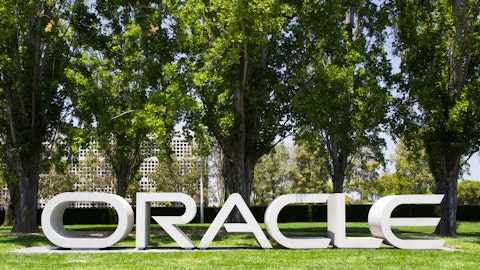While Insider Monkey is not necessarily an avid advocate of technical analysis, we will have a look at the hedge fund sentiment towards five stocks that have been gaining momentum in the past several weeks. Precisely, our team will lay out a list of five stocks seeing their relative strength index (RSI) rise in the past two trading weeks that fell out of favor with the hedge funds monitored by our team.
The RSI, considered one of the most popular and useful technical indicators, is designed on the basis of the speed and direction of a stock’s price movement. We will now give a brief overview of how the indicator is computed so that one can fully comprehend what it means and how it can be used. Let’s assume that one wants to calculate the 14-day RSI and that the stock in question went up on nine days and closed in the red on five days. The absolute gains, the difference between a stock’s closing price on a given day and the closing price on the previous day, on each of those nine days are added up and divided by 14 in order to calculate the average gains. Correspondingly, the absolute losses on each of the five losing days are added up and divided by 14 in order to calculate the average losses. And the ratio between these two values is called relative strength (RS). Finally, the RS indicator is normalized so that the value of the indicator would fall in the range of zero to 100. With that in mind, let’s have a look at five stocks with rising 14-day RSI that lost appeal among the hedge funds followed by Insider Monkey during the first quarter of 2016.
At Insider Monkey, we track around 770 hedge funds and institutional investors. Through extensive backtests, we have determined that imitating some of the stocks that these investors are collectively bullish on can help retail investors generate double digits of alpha per year. The key is to focus on the small-cap picks of these funds, which are usually less followed by the broader market and allow for larger price inefficiencies (see more details).

wrangler/Shutterstock.com
#5. Civitas Solutions Inc. (NYSE:CIVI)
– Hedge funds with long positions as of March 31: 7
– Value of hedge funds’ holdings as of March 31: $20.12 Million
– RSI: 22.15
Civitas Solutions Inc. (NYSE:CIVI) fell out of favor with the hedge funds followed by Insider Monkey during the first quarter of 2016, as the number of funds invested in the company dropped to seven from 11 quarter-over-quarter. However, the overall value of those hedge funds’ equity investments in the company fell by 36% quarter-on-quarter to $20.12 million, mainly due to a 39% drop in the value of Civitas shares. The provider of home- and community-based health and human services has seen its market value plummet by 23% since the beginning of 2016 despite the stock being up 38% in the past three months. The company’s consolidated gross revenue for the three months of 2016 was $349.09 million, up from $338.87 million recorded a year ago. The increase was mainly driven by a series of acquisitions closed during the quarter. Ken Griffin’s Citadel Advisors LLC owns 136,301 shares of Civitas Solutions Inc. (NYSE:CIVI) as of March 31.
Follow Civitas Solutions Inc. (NYSE:CIVI)
Follow Civitas Solutions Inc. (NYSE:CIVI)
Receive real-time insider trading and news alerts
The next two pages of this article will discuss the hedge fund sentiment towards four other stocks with rising RSI.
#4. Smith & Wesson Holding Corp (NASDAQ:SWHC)
– Hedge funds with long positions as of March 31: 24
– Value of hedge funds’ holdings as of March 31: $121.78 Million
– RSI: 29.07
There were 24 asset managers tracked by our team with long positions in Smith & Wesson Holding Corp (NASDAQ:SWHC) at the end of the March quarter, as compared to 27 registered at the end of the December quarter. The aggregate value of those positions fell by 11% quarter-on-quarter to $121.78 million even though Smith & Wesson’s shares gained 21% during the quarter. The U.S. manufacturer of firearms has seen its shares advance by 32% since the start of 2016, partially owing to the recent shooting of Dallas police officers that intensified the gun control debate. Although U.S. president Barack Obama has been making impassioned appeals for more gun controls lately, demand for the gun maker’s products did not suffer any blows. Smith & Wesson’s net sales for fiscal 2016 that ended April 30 totaled $722.9 million, an impressive increase of 31.0% year-over-year. One may get the feeling that calls to increase gun control invite more buyers to stores. David Costen Haley’s HBK Investments was the owner of 341,500 shares of Smith & Wesson Holding Corp (NASDAQ:SWHC) at the end of March.
Follow Smith & Wesson Brands Inc. (NASDAQ:SWBI)
Follow Smith & Wesson Brands Inc. (NASDAQ:SWBI)
Receive real-time insider trading and news alerts
#3. Target Corporation (NYSE:TGT)
– Hedge funds with long positions as of March 31: 34
– Value of hedge funds’ holdings as of March 31: $1.10 Billion
– RSI: 71.31
The number of hedge fund vehicles from our system invested in Target Corporation (NYSE:TGT) fell to 34 from 38 during the January-to-March quarter, while the value of those funds’ equity stakes in the company shrunk by 15% quarter-over-quarter to $1.10 billion. Just recently, the second-largest discount retailer in the U.S. announced the launch of a new kids apparel brand called Cat & Jack, a move believed to represent an important step in the company’s long-term revitalization plan. The retailer will replace its well-known in-house Circo and licensed Cherokee kids’ labels with a trendier brand, betting that sales will climb at twice the rate of children’s lines at competitors such as Kohl’s, the Children’s Place and others. The shares of the Minneapolis-based company are down a little less than 2% since the start of the year, but the stock has gained 5% in the past month alone. Jim Simons’ Renaissance Technologies had 1.84 million shares of Target Corporation (NYSE:TGT) among its holdings on March 31.
Follow Target Corp (NYSE:TGT)
Follow Target Corp (NYSE:TGT)
Receive real-time insider trading and news alerts
The last page of this article will reveal the hedge fund sentiment towards the two remaining stocks with rising RSI.
#2. Biogen Inc. (NASDAQ:BIIB)
– Hedge funds with long positions as of March 31: 64
– Value of hedge funds’ holdings as of March 31: $3.11 Billion
– RSI: 251.30
There were 64 asset managers from our database with long positions in Biogen Inc. (NASDAQ:BIIB) at the end of March, down from 71 recorded at the end of December. The overall value of those positions fell by 17% during the March quarter to $3.11 billion, mainly due to a 15% decline in the value of Biogen shares. The neurology-focused biotechnology company has seen the value of its shares drop by nearly 18% thus far in 2016. The biotech giant generates more than 80% of its top line from its multiple sclerosis products such as Tecfidera, Avonex, Plegridy, Tysabri and Fampyra, which have been challenged by strong competition, pricing pressures, as well as narrower untreated market. Biogen’s top line increased by approximately 11% last year, significantly lower than the whopping 40% increase registered in 2014. The company’s sales are anticipated to increase in the range of 5%-to-7% each year until 2020, so sales expectations are not overly promising for the upcoming years. Jacob Gottlieb’s Visium Asset Management acquired a new stake of roughly 382,000 shares of Biogen Inc. (NASDAQ:BIIB) during the first quarter of 2016.
Follow Biogen Inc. (NASDAQ:BIIB)
Follow Biogen Inc. (NASDAQ:BIIB)
Receive real-time insider trading and news alerts
#1. Synchrony Financial (NYSE:SYF)
– Hedge funds with long positions as of March 31: 67
– Value of hedge funds’ holdings as of March 31: $3.45 Billion
– RSI: 27.31
Synchrony Financial (NYSE:SYF) lost some of its charm among the hedge funds monitored by Insider Monkey, with the number of funds invested in the company falling to 67 from 82 during the first quarter of 2016. The overall value of those hedge funds’ stakes in the private label credit-card issuer declined by 20% quarter-on-quarter to $3.45 billion, partly due to a 6% drop in the value of Synchrony Financial shares. The shares of General Electric Company (NYSE:GE)’s former consumer credit card business, spun off in July 2014, gained 8% in the past five trading sessions, after the company’s Board of Directors approved its first quarterly-dividend of $0.13 per share, along with a $952 million share repurchase program. The freshly-approved dividend yields 1.90% annually. In mid-June, the largest U.S. issuer of retail-store credit increased its forecast for credit losses over the next 12 months as consumers struggle to repay loans. The company has seen its market capitalization plunge by 10% since the start of 2016. Adage Capital Management, run by Phillip Gross and Robert Atchinson, reported ownership of 9.84 million shares of Synchrony Financial (NYSE:SYF) in its latest 13F.
Follow Synchrony Financial (NYSE:SYF)
Follow Synchrony Financial (NYSE:SYF)
Receive real-time insider trading and news alerts
Disclosure: None





